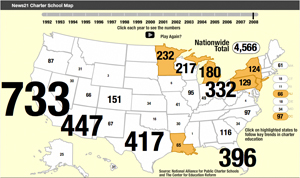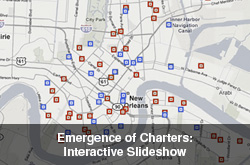School Stories heads to ‘NOLA’
Meghan Berry | Jun 04, 2009 | Comments 0
By MEGHAN BERRY
Over the next few months, Alexandra Fenwick and I will be covering the charter school movement in New Orleans for our News21 fellowship. We are gearing up for our first trip south and want to hear from students, teachers, administrators, policy makers and regular residents of this dynamic city.
Coverage of New Orleans is key in telling the charter school story. (Other fellows will be reporting from Minnesota, Washington, D.C., Michigan, Appalachia, Pennsylvania and New Jersey.)

About 350 of New Orleans' teachers came to the profession through programs like Teach for America and The New Teacher Project. File Photo
Statistics vary, but close to 60 percent of New Orleans public school students attend charter schools, which have flourished in the wake of Hurricane Katrina. The pre-Katrina school system was known as one of the worst in the country.
Paul Tough characterized it this way: “The dysfunction in the city’s school system extended well beyond the classroom: a revolving door for superintendents, whose average tenure lasted no more than a year; school officials indicted for bribery and theft; unexplained budget deficits; decaying buildings; almost three-quarters of the city’s schools slapped with an ‘academically unacceptable’ rating from the state.”
The devastation inflicted by Hurricane Katrina left room for a complete overhaul — new buildings, new teachers, new administrators and a new model for schools. But it remains to be seen whether New Orleans’ extreme makeover is a value added for its students.
“Now there are more schools than students,” said Sarah Carr, an education reporter at The Times Picayune newspaper in New Orleans. She explained that families are still moving back to the city, while the market for schools has become saturated, particularly with high schools.”
In our first trip to New Orleans, Ali and I plan to learn more about the city’s new body of teachers — about 350 of which came to the city through programs like Teach for America and The New Teacher Project. It’s been reported that this group outperforms traditionally trained teachers. Is this the result of youthful energy? How do these programs prepare out-of-towners to teach in a culture so different from their own?
Ali and I are also interested in learning more about how the proliferation of charter schools has affected enrollment at parochial, private and regular public schools in New Orleans.
“If charters talk and look like private schools but you can go for free, it makes sense that they would be attractive to parents,” Jeff Henig, a professor at Columbia University Teacher’s College, said to our class recently.
Choice is a big part of charter schools, however we’ve yet to find a comprehensive resource available to parents navigating the new system. So many new schools have sprung up, but how do parents learn about the options? Transportation also plays a major role in the choice process. Many families, who’ve yet to move back into the city, drive their children to school from the suburbs. We plan to produce a multimedia project —possibly an interactive map — that illustrates the breadth of New Orleans’ school choice.
We have several more exciting plans on the horizon, which will evolve as we plunge deeper into reporting. Readers can track our progress on the soon-to-launch News21 blog.
Filed Under: New Orleans in Depth • Unchartered Territory
About the Author: Meghan Berry is a multimedia journalist and photographer from New Jersey. She has worked as a newspaper reporter and in communications at various educational institutions since earning a B.A. in English from Gettysburg College in 2003. Berry enjoys reporting on education, health and environmental issues. Her other interests include world travel and pug walking. She graduated from Columbia University’s Graduate School of Journalism in 2009.













